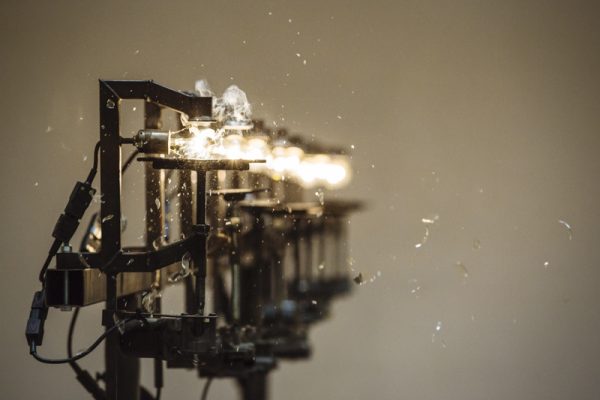Julius Caesar. Spared Parts.

Dramatic intervention on W. Shakespeare
Conceiving and staging: by Romeo Castellucci
Julius Caesar: Gianni Plazzi / Corrado Della Libera
Mark Antony: Nicola Frangione
…vskji: Sergio Scarlatella
Director assistant: Silvano Voltolina
Sound technician: Nicola Ratti
Production: Benedetta Briglia
Promotion and communication: Gilda Biasini, Giulia Colla
Administration: Simona Barducci, Elisa Bruno, Michela Medri
Economic consultant: Massimiliano Coli
Production: Societas
In the frame of ‘and the fox said to the crow. General linguistics course’
Special Project City of Bologna 2014
Photo: Guido Mencari
A revisitation of Julius Caesar, staged for the first time by the Socìetas Raffaello Sanzio in 1997, cannot be mistaken for a mere indulgence in nostalgia or a simple display of vanity.
The separate discourses of “…vskij” and Marco Antonio are now seen directly facing one another, like two living nuclei. These pieces are detached, as though they alluded to a whole but, at the same time, went beyond it functionally. These finely chiselled images of a drama inherent to the voice act out a struggle against the power shrouded by the force of words. The topology of (the actor’s) speech, entirely enveloped by language and its machines, and its compromise with rhetoric, represent the two extremes of a polarity whose form consists of moulds and imprints. At the centre lies the body – above all, the locutionary organs.
On one side: the protagonist of “…vskij”, a veiled allusion to one of the founding fathers of theatre, inserts an endoscopic video camera in his nasal cavity until it reaches the glottis. The path followed by the endoscope is projected on a circular screen, visualising a reverse voyage of voice production that continues until it reaches the vocal cords. This long tube acts as a channel for breath and for the words of the dialogue between Flavio, Marullo and Ciabattino, up to the curtain of flesh that shows the sexual origin of words; this tautological limit of the voice coincides with the audible-visible vibration of the oral cavity. An absolute tattoo on phonation.
From above: Marco Antonio has undergone a laryngectomy. The funeral oration at the rhetorical peak of the drama is elevated, as though on a pedestal, and a singular technique of vocal emission gives tension to this monument. The voice, deprived of its fleshy throat, becomes an oesophageal pulsation, a pure commotion of vibration. Any articulation of meaning becomes blurred and disappears: only vocal modulation remains, already half gone and, suddenly, absorbed by bodily noises. Speech coming out of the open throat now becomes the exoskeleton of rhetorical persuasion, and discourse literally coincides with an utterance from a “wound”, the only phonation that can support the tale told by Julius Caesar’s body, perforated by “mute mouths”. This body without the organ of language (the vocal cords) is the emblem of a body that is eloquent in itself, like an “I” invaded by a corpse perched on the throne of speech in a naked exhibition of the scourged body.
In a negative theology of the voice, the hole through which Marco Antonio’s breath passes, offers us a glimpse of the (absent) inverted throat of “…vskij”.
Piersandra Di Matteo